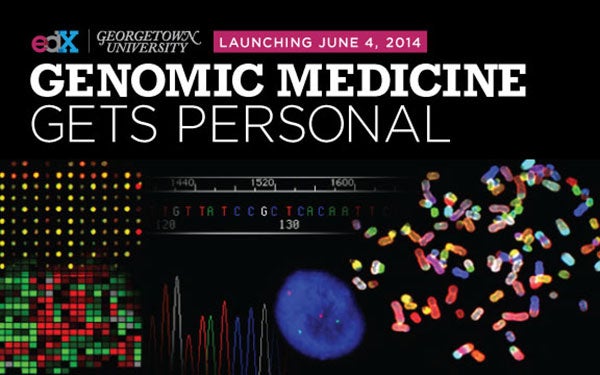Title: Congresswoman’s Breast Cancer Experience to Open Med Center MOOC
Georgetown will launch its eight-session online course on genomic medicine with U.S. Rep. Debbie Wasserman Schultz (D-Fla.) sharing her personal experience with breast cancer on June 4.

U.S. Rep. Debbie Wasserman Schultz (D-Fla.) will provide an overview of her experience with breast cancer during the first session of Georgetown University Medical Center’s first massive open online course (MOOC).
Like many other diseases, breast cancer is increasingly understood in terms of its genetic basis. The genomic discoveries contributing to understanding of this disease and many others are the subject of Genomic Medicine Gets Personal, a course for which more than 20,000 have signed up.
The eight-session, 16-hour-plus course launches June 4.
Presenters are experts in various aspects of genomic medicine, but nonscientists such as Wasserman Schultzwill also lend their perspectives for the course.
Third Georgetown MOOC
This is the third MOOC Georgetown has offered in partnership with the online learning initiativeedX.
Last fall, theSchool of Foreign ServicelaunchedGlobalization’s Winners and Losers: Challenges for Developed and Developing Countries. This spring the Kennedy Institute of Ethics sponsored Introduction to Bioethics.
All three courses are funded by Georgetown’sInitiative on Technology-Enhanced Learning(ITEL), an $8-million effort to foster innovative teaching approaches, and produced by Georgetown’sCenter for New Designs in Learning and Scholarship (CNDLS) in collaboration with the faculty course teams.
Broad Implications
The GUMC MOOC is designed as a primer on a field that “has implications in each and every part of medicine,” saysDr. Bassem Haddad, an associate professor of oncology and obstetrics and gynecology who serves as course director.
The subject of genomics is moving so fast that traditional medical school lectures can’t always adequately capture the field’s evolution, says Haddad, who also co-directs theSchool of Medicine’s molecular and human genetics courses.
“Rarely a day passes without news of current or future use of genetics in medicine – how a mutated gene can be targeted to treat cancer, how genomic testing can reveal disease susceptibility, whether genes contribute to brain disorders … and therefore could be prevented or treated,” he says.
Recognized Experts
Other notable speakers for the course will be Dr. Eric Green, director of theNational Institutes of Health National Human Genome Research Institute, and Cynthia Morton, president of the American Society of Human Genetics (ASHG).
An array of Georgetown faculty experts also will discuss topics such as prenatal diagnosis and genomic screening for disease susceptibility and use of genomics for personalized treatment of cancer and other medical conditions.
“We are tapping the best there is, including recognized experts at Georgetown, showing the depth of our institution’s knowledge in genomics,” Haddad says. “Genomics is a priority for research at the medical center and for teaching at the medical school.”
Living Course
Elements of the MOOC can be used to supplement medical school curriculum or repurposed for another online medical school course or for continuing medical education credits, he explains.
Haddad says that everyone involved with in creating the MOOC demonstrated “nothing short of complete engagement.”
“This is a novel way of teaching and everyone feels the educational potential,” Haddad says. “Our plan for this MOOC is to make it a ‘living course’ that we will continually update and keep online for a long time to come. It will serve the needs of the public, professionals and our own medical students.”